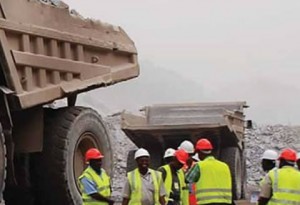No comprehensive policy on safety in extractive industry – Chamber
 The Sekondi-Takoradi Chamber of Commerce and Industry (STCCI) has expressed concern about the country’s inability to have a broad national occupational health, safety and environment policy in the extractive industry.
The Sekondi-Takoradi Chamber of Commerce and Industry (STCCI) has expressed concern about the country’s inability to have a broad national occupational health, safety and environment policy in the extractive industry.
The Industry said the country has pieces of scattered legislations and regulations such as the Environmental Protection Agency (EPA) Act 490 and factories, offices and shops Act, LI 328 and that an effective policy would provide standards for adherence by the industries.
Mr Ato Van-Ess, Chairman of STCCI said this in Accra at a press launch of the Ghana Extractive Industry Safety Conference on the theme: “Driving Industry Excellence Through Health and Safety”.
The conference to be organized by the STCCI, in collaboration with the Honorary Consulate of Trinidad and Tobago and stakeholders in the industry, would take place in Takoradi from March 18 -20, 2015.
The objective is to identify new trends, standards, innovations, risks and opportunities in health and safety in the extractive industry.
The conference would provide a platform for private-sector companies, both local and international to share experiences, knowledge, innovations and plans on occupational health and safety, environment standards and quality.
It would also analyze and develop evidences to advocate the promulgation of the necessary policies and laws for occupational health and safety in the country.
Mr Van-Ess said the global extractive industry thrives on high health, safety, environment and quality standards, stressing that, local businesses do not have comprehensive safety systems in place, making it difficult to secure contracts in the sector.
He said at best, the local businesses are only able to access peripheral jobs or contracts with low monetary values from sub-contractors, making the achievement of the local content law in the oil and gas sector difficult.
“There are increasing number of local businesses and multi-national companies in the country due to favourable economic conditions, and that, with reliable and secured energy and policy on safety, the country would be a preferred choice for strategic investment opportunities”, he added
Mr Van-Ess advocated the need to build a safety culture that is proactive and holistic through advocacy to ensure effective policies for occupational health and safety, education on safety awareness and encourage organizations and employees to pursue safety, re-engineering of processes to suit peoples’ culture.
Source: GNA
